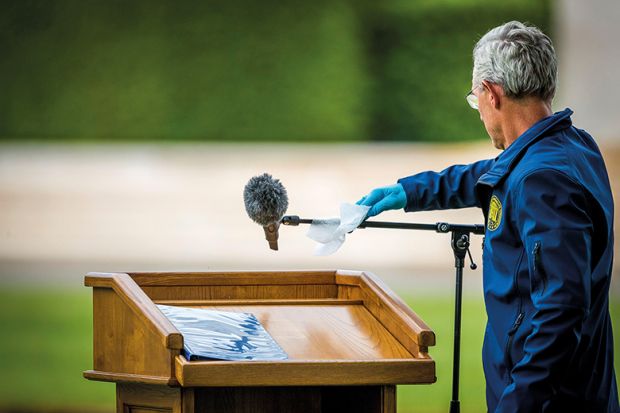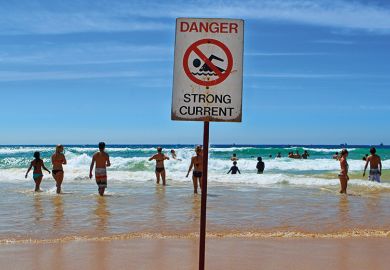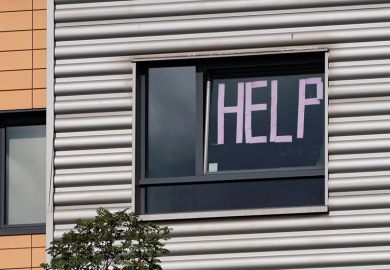“I’m writing to ask an unorthodox question. I have become concerned that the piece I published with THE might be taken the wrong way, given the direction US cultural discussions are headed right now. I am worried that the way I worded a few things may be taken as inflammatory and could affect my ability to secure future employment. Is there any way that the piece could be removed?”
The contributor who made this recent enquiry was only half correct in describing it as unorthodox. It is certainly true that deleting articles because they might challenge prevailing views is not editorial policy – indeed, that is very often the whole point of an opinion piece.
But nor is it anywhere near as unusual a request as it once was.
The idea that free speech is under attack in universities has been a mainstay for those hostile to higher education, but that does not mean that there is no case to answer. And if honestly held, reasonably argued opinions cannot be shared without fear of repercussion, that is a very big problem.
So is academic freedom, and its stablemate, institutional autonomy, really on life support? And, if they are, to what extent are self-censorship, social media mobs, fault lines within academia, or the actions of university managers and their lawyers to blame?
That this pressure comes from more than one source is obvious, but it was still striking to talk with Michael Ignatieff, president of the Central European University, recently, and hear him say that of all the difficulties he had faced in his tumultuous tenure, the no platforming of a right-leaning speaker on campus had upset him the most.
This act of self-sabotage, as he saw it, was worse than anything done by Viktor Orbán’s government as it forced the CEU out of Hungary, precisely because it came from within.
In our cover story this week, we explore the issue at length, talking to those on all sides of the argument to understand what is really being fought over.
At its heart is a crucial question: are freedom of thought, speech and enquiry being sacrificed on the altars of groupthink, online point-scoring and managerial imperatives – or is free speech being used too often as a straw man, to obfuscate or deflect attention from the real issues at play?
If this sounds like a thorny topic, then even spikier in the short term, at least, is how universities and governments should respond to what in the UK and US is looking increasingly like a worst-case scenario, following the reopening of campuses during the Covid-19 “second wave”.
As many predicted, the virus is ripping though student populations, and while a growing number of universities have shifted temporarily to online-only delivery, students stuck (and spreading the disease) in shared accommodation is a huge problem.
The extent to which universities are to blame is debatable – in any case, the decisions that are being made sector by sector are usually between bad and worse options during this crisis, and counterfactuals are rarely as straightforward as they might seem.
But institutions are stuck with the problem, and the mitigating circumstances will only protect them so far.
As I write this, I have two newspaper home pages open on my laptop screen. The Times features a column arguing that students forced to quarantine in halls “may be stoic, but they won’t forget”, while The New York Times, also reporting on events in the UK, characterises the situation as “abandonment”, stating that universities focused primarily on the bottom line had “beckoned students back to campus with predictably dire results”.
The University and College Union, which has been calling for the autumn term to be delivered remotely for several months, is positioning universities as the “care homes of the second wave”.
Again, it is important to weigh events against the alternatives – but in the case of higher education, where online delivery works, the balance of risk and reward seems increasingly one-sided given what we now know about the high rates of infection.
And in our news pages we explore an additional element with the potential to weigh heavily against face-to-face: the long-term effects of Covid-19 on the health of even young, healthy individuals.
If evidence of so-called long Covid continues to grow during a campus-fuelled second wave, then the scales will shift decisively.
Register to continue
Why register?
- Registration is free and only takes a moment
- Once registered, you can read 3 articles a month
- Sign up for our newsletter
Subscribe
Or subscribe for unlimited access to:
- Unlimited access to news, views, insights & reviews
- Digital editions
- Digital access to THE’s university and college rankings analysis
Already registered or a current subscriber? Login


